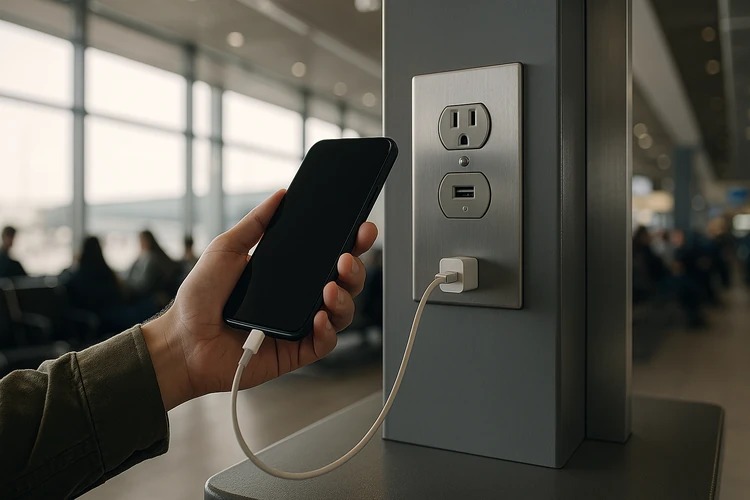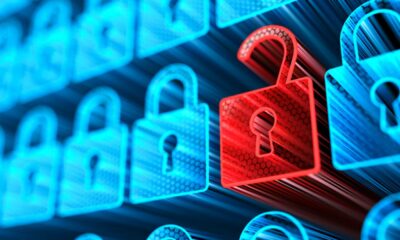Business
South Africans Urged to Stop Using Public USB Chargers as New Cyber Threats Emerge

The everyday habit that could cost you
If you have ever found yourself at an airport with one percent battery left or checked into a hotel room and spotted a convenient USB port next to the bed, you are not alone. South Africans rely on these quick charging points more than ever because they are familiar, easy to use, and often more visible than traditional plug sockets. For travellers this convenience feels like salvation when you have the wrong plug adapter or your charger has vanished into a suitcase somewhere.
Yet that same convenience now comes with a warning from global cybersecurity authorities. Connecting your phone or tablet to a public USB port in a hotel, restaurant, or airport could open a direct path for criminals to tamper with your device.
The hidden risk called juice jacking
Public USB chargers are not only power sources. Every USB port is also a data connection point. If a criminal modifies that port or cable with malicious hardware, it can quietly install harmful software, access your personal data, or even export passwords.
Warnings about this tactic have come from major organisations like the United States Federal Communications Commission and the Federal Bureau of Investigation. They confirm that malware delivered through compromised USB ports can lock your device, copy your files, or leak your login credentials. That information can then be used to break into online accounts or sold on underground markets.
Why this matters in South Africa
Because USB sockets are becoming standard in hotels, guest houses, restaurants, and airports across the country, the risk grows with every new installation. These ports require less space and cost far less to install than traditional AC sockets, so businesses add them quickly. Travellers often prefer them because they avoid the issue of adapter compatibility.
This rapid adoption means more opportunities for criminals. While South Africa has not recorded widespread public cases yet, global warnings and local cybersecurity experts agree that the threat is real enough to avoid the risk altogether.
Your best defence: plug into the right place
The safest option is still the simplest. Use a regular AC power socket whenever possible. That connection does not expose your phone to data transfer because it provides power only. When that is not available, you should always use your own charging adapter and cable.
If a device asks you to select a mode when you plug in, choose the charge-only option. This limits your phone to receiving power but not sending or receiving data. However, recent tests show that advanced malicious cables can spoof user input and override these safety prompts. This proof of concept has been demonstrated on Android and iOS devices, proving how fast attackers adapt.
To avoid this, cybersecurity specialists recommend using a USB cable designed without data transmission or a small device called a USB data blocker.
An even safer choice for everyday life
Carry a power bank. It avoids public chargers altogether and removes you from the risk chain. For most people, this is the simplest and most reliable solution, especially during travel or load shedding.
Cable-free threats are rising, too
The trap behind free public Wi-Fi
Public charging is not the only danger. Everyday habits like connecting to free Wi-Fi in coffee shops or airports can be equally risky. Cybercriminals can clone a legitimate network name to create what experts call an evil twin. Once you connect, they can monitor your traffic or intercept your data.
Sometimes the official network is simply unsecured, allowing an attacker to slip in unnoticed. Google has warned Android users that public Wi-Fi can be unencrypted and easy to exploit. Their advice is to avoid these networks when possible and pay attention to safety alerts.
How to use Wi-Fi more safely in public
If you must connect, use a password-protected network where you must request the login details from an employee. This adds a layer of credibility and reduces the chance of connecting to a fake hotspot. Avoid using sensitive apps like online banking in public spaces. Cybercriminals can also steal information by casually glancing at your screen, a simple move that still catches many people off guard.
It is also wise to keep personal details private. Sharing a phone number or email address in public can give criminals enough information to craft convincing phishing messages.
Whether you are boarding a flight, working from a cafe, or checking into a hotel for the weekend, the easiest choices are not always the safest. South Africans are increasingly reliant on mobile devices, and this makes caution essential. Carry your own cable, bring your own power source and think twice before connecting to anything labelled “free.”
Protecting your data begins with the tiny decisions you make every day.
Also read: Ackerman Family Reduces Pick n Pay Stake Amid Turnaround Success
Follow Joburg ETC on Facebook, Twitter, TikT
For more News in Johannesburg, visit joburgetc.com
Source: MyBroadband
Featured Image: Consumer Affairs

























